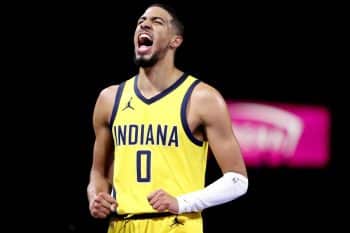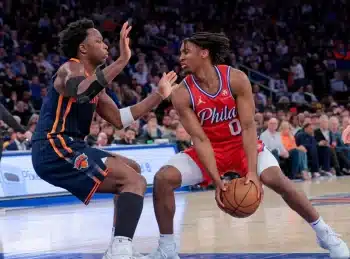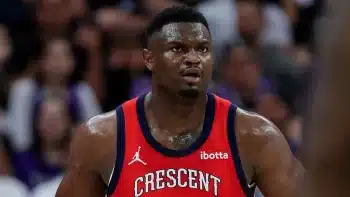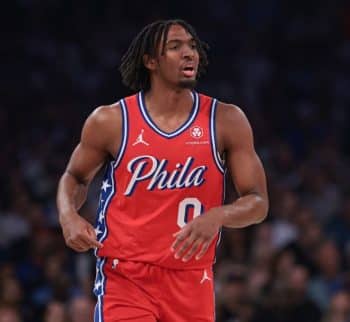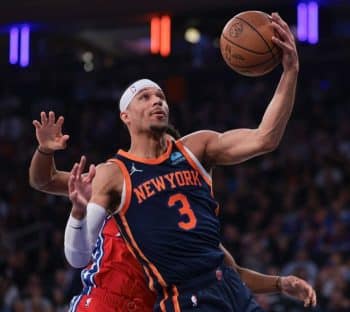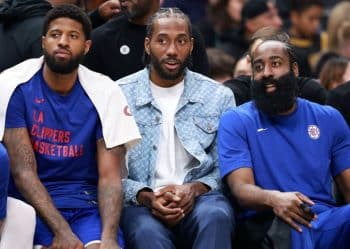NBA
Fixing The Utah Jazz

You might think a team ranked in the bottom six league-wide in points per game, team rebounds and assists per game would need some wholesale changes moving forward. In the case of the Utah Jazz, a team likely to finish the season toward the bottom in all three categories and with one of the NBA’s worst records, that might not necessarily be the case.
Beyond what is certain to be a high lottery pick, these Jazz already have a promising young core in place that may simply need experience, direction and one or two more pieces moving forward. They’re in the process of a designed youth movement, after watching multiple veterans like Al Jefferson (Bobcats), Paul Millsap (Hawks) and Mo Williams (Blazers) move on to different locations prior to the start of 2013-14. Here’s what the Jazz should do as they continue to rebuild:
Stockpile weapons for Trey Burke
Burke may have been slowed by a broken middle finger that caused him to miss the first 12 games of the year, but that hasn’t stopped him from playing his way right into the conversation for what could end up being a tough Rookie of the Year decision. While he’ll have to work toward being more efficient (as most rookie guards do), Burke has already shown the ability to score in transition, with the ball in his hands, and the Jazz have also done a good job of trying to develop him as an off-ball threat in the halfcourt set.
Additional scoring options would assist in taking some of the pressure off Burke as he continues to grow as a player. Derrick Favors, Alec Burks and Gordon Hayward are each nice and vital pieces to the puzzle, but having a prolific scorer you can depend upon for a consistent tally somewhere in the range of 18-20 points per game would round out a talented bunch.
The jury may still be out on whether any of those other players might one day be able to develop into that go-to scorer, but as the Jazz currently sit with the fifth-worst record in the league (23-49), they’ll likely land somewhere within the top few picks in the draft lottery for the chance at landing a guy like Duke’s Jabari Parker.
Placing aside the expected social media slander that followed relatively tough performances (13-38 FG’s combined) in what are likely to be his final two college games, Parker is still a very gifted scorer and a player who obviously still projects well at the next level. His defense and toughness will undoubtedly be tested in the NBA, but those are aspects of his game that can definitely be worked upon and improved. The Jazz will also have Golden State’s first-round pick in the 2014 NBA Draft as well, so this is a team that could end up doing some real damage in the draft, especially if the Warriors end up somewhere in the mid-teens range.
Arming Burke with a guy like Parker would be ideal, as he’s already shown a willingness to be a playmaker for others. Another player that could also end up filling that scoring void could be Creighton’s Doug McDermott. With current draft projections anywhere from 5-13, depending upon how his pre-draft workouts turn out, it is quite possible McDermott could slip somewhere close to the Warriors’ pick. The purchase of draft picks is somewhat rare (not unheard of), but could be an option for even a nearby swap with additional cash considerations for a team with over $25 million in available cap space.
Continue developing Favors
It isn’t beyond the realm of imagination to picture Derrick Favors as a least a “17/11” guy the Jazz had to have envisioned when they decided to re-sign the 22-year-old power forward to the tune of four years at $49 million just before the season. We wouldn’t expect their front office to be disappointed by his 12.8 PPG, 8.6 RPG (per se), but it is clear the organization has a great deal of expectations for the future with Favors anchoring their post attack. He’s great while on the move and finishing at the rim, but needs to continue to develop a couple reliable countermoves to a solid over-the-shoulder hook and the power moves he tends to rely upon.
Favors got into the best shape of his career prior to this season, and the Jazz have to be pleased by the fact that he appears to be the type of player who will look to continue rounding out his game year to year. As he continues to develop those secondary moves and fully learns how to properly utilize his strength and size in order to be even more of an impact player on the defensive end, we may be looking at one of the league’s premier post players within the next few seasons. Utah certainly hopes that ends up being the case.
Find a way to re-sign Gordon Hayward
With only $27 million in guaranteed contracts (and about $9 million in non-guaranteed salary), the Jazz should have plenty of cap space and freedom to get a deal done with Hayward. There have been concerns about Boston potentially entering the Hayward sweepstakes given the Brad Stevens (Butler) ties, but the Jazz clearly have the cap space to make it work if the Celtics were to force a slight bidding war.
If contract negotiations were to eventually break down with Hayward, Utah isn’t left without options entirely. Both Sacramento’s Rudy Gay and Cleveland’s Luol Deng could potentially hit the market with few teams more able to provide a sizable long-term contract than the Jazz. Hayward may not be interested in signing a deal similar to the Favors extension at this point in his career, but either of those veterans could potentially be willing, depending upon the other offers they receive.
Hayward may still be the best fit for the Jazz (and vice versa), but Gay (offense) and Deng (defense) could also produce in various ways based upon the future direction of the team.
Determine what type of team they ultimately want to be
GM Dennis Lindsey has alluded to the Miller family’s (owners) loyalty to both players and coaches several times this season, but that doesn’t necessarily mean head coach Tyrone Corbin is expected to return. Deliberation over the future employment of either coaches or players isn’t something taken lightly, but we would be remiss if not honest about Corbin’s chances of being replaced. Corbin, himself, knew the risk when entering the final year of his deal without reaching an extension, so the speculation comes as no surprise. Burke’s late arrival could didn’t help, but it has appeared the Jazz have struggled to develop a true identity throughout 2013-14.
Are they an uptempo team or do they prefer to lean upon a heavier rotation of halfcourt motion? The trouble with so many young teams during the development stages is that while they’ll show flashes of being able to do one or the other at times, their inability to sustain either approach tends to lead to the specific type of inconsistency the Jazz have shown. Even though Corbin cannot be solely held accountable for the growing pains of being young and inexperienced in today’s NBA, the organization is almost certain to reevaluate that position and their direction, moving forward.
Jerry Sloan’s name will always be floated as a potential option, especially with the former long-time Jazz coach already serving in a Senior Advisor capacity, but expect candidates like Lionel Hollins and even George Karl to surface in the event that a change is made.
Round out the bench with productive veterans
Alec Burks and Enes Kanter are nice pieces that have developed into dependable contributors, but with Richard Jefferson, Marvin Williams and Andris Biedrins all having expiring deals, the organization could decide to move in a different direction across the board. Although the bigger-named players may shy away at times, guys like Spencer Hawes, Trevor Ariza and perhaps even the aforementioned Deng might end up being possibilities depending upon what the market dictates their value to be.
The organization has already placed a great deal of trust within their floor general from a day-to-day perspective, but each of those options are not only still capable of contributing, but can also provide veteran leadership in support of Burke.
“[Losing is] difficult,” Burke recently told KOAL AM 750’s Jordan Buscarini. “Because we all love winning. We all want to play in the playoffs and experience that, but there’s time for that. We understand that it’s a growing process for this franchise right now.”
Beyond Burke’s play, his maturity level and leadership qualities have Jazz fans envisioning a rapid ascension among the Western Conference standings in the years to come. If they are able to nail this draft as well as the free agency period that follows, their rebuilding timeline could be significantly streamlined.
